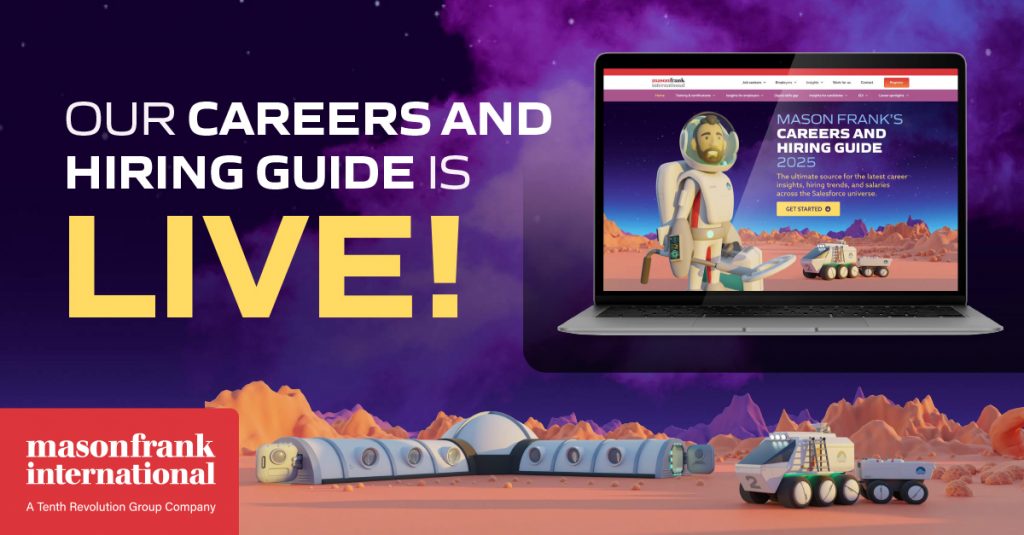
Mason Frank’s Careers and Hiring Guide 2025 is live! Now in its eleventh year, the must-read report is packed with in-depth insights into the Salesforce community today, sourced from almost 600 Salesforce professionals.
From data about what the working landscape looks like for Salesforce professionals to certifications, skills, and the latest salaries from across the world, the report is chock-full of useful information for Salesforce professionals and hiring managers alike.
This year, you’ll once again be able to access the full survey findings on the report microsite, with the salary report and key findings available to download for free.
Mason Frank's
Careers and Hiring Guide
The guide features insightful commentary from thought leaders from across the Salesforce world, helping you unearth valuable, actionable takeaways that you can apply in your career or organization.
Also returning are our popular Career Spotlights, showcasing the most sought-after roles in the Salesforce ecosystem, plus the skills and certifications you need to succeed in them.
The report will also take a look at equality, diversity and inclusion in the Ohana, breaking down the current makeup of the community and hearing directly from Salesforce professionals about what more can be done to boost representation and close skills gaps.
Here’s a sneak peek at what you can expect to learn in our latest edition:
82% of respondents currently hold at least one Salesforce certification, with those having earned a certification reporting an average salary increase of 18%.
Certifications continue to be in demand in the Salesforce ecosystem, with many professionals earning a post-certification raise in return for their accreditation.
We’ve also seen an increase in the number of employers paying for certifications, in part or in full, showing a growing awareness of the importance of upskilling and investing in professional development.
59% of respondents don’t believe you need a degree to work with Salesforce, and 95% are using Salesforce Trailhead to upskill.
The majority of Salesforce professionals don’t feel that having a degree is necessary to build a career in Salesforce, which is great news for career changers or those eyeing a career from outside the ecosystem (and for hiring managers looking to fill a growing number of Salesforce jobs).
Instead, many respondents prioritize self-driven learning, like earning certifications or using Salesforce’s free training platform Trailhead when it comes to boosting their skills.
51% of professionals say they’d prefer to work entirely remotely.
The appetite for remote and flexible work isn’t going away, with a majority of Salesforce professionals telling us that fully remote work is their preferred model. Professionals also put home working top of the list of benefits that would be most likely to convince them to accept a new role.
Candidate preferences are something that employers need to take note of if they want to land the best talent, especially with 39% of hiring managers citing their biggest tech staffing challenge as paying the market rate for candidates.
72% of professionals experienced a salary increase when moving to a new employer.
Highlighting the competitive nature of the talent market, almost three-quarters of professionals received a salary increase when they changed jobs, with the average pay bump sitting at 20%.
With employers offering higher salaries to tempt candidates to take on their roles, salaries are being driven up. However, offering regular pay rises may not be the only way to retain employees—many respondents reported that they’d actually taken a pay cut when changing jobs in return for a better work-life balance.
Just 55% of Salesforce professionals believe their employer is providing equal pay for equal work.
Fewer than half of professionals in the Salesforce ecosystem believe that their employer pays those working the same jobs the same salary, which indicates that no matter how much progress has been made when it comes to EDI, there is still a long way to go.
Boosting representation in the tech space is essential, and new, more diverse talent is not going to be attracted to the Salesforce ecosystem if they don’t believe they will be paid fairly.
Download the key findings including the latest salary tables now.


